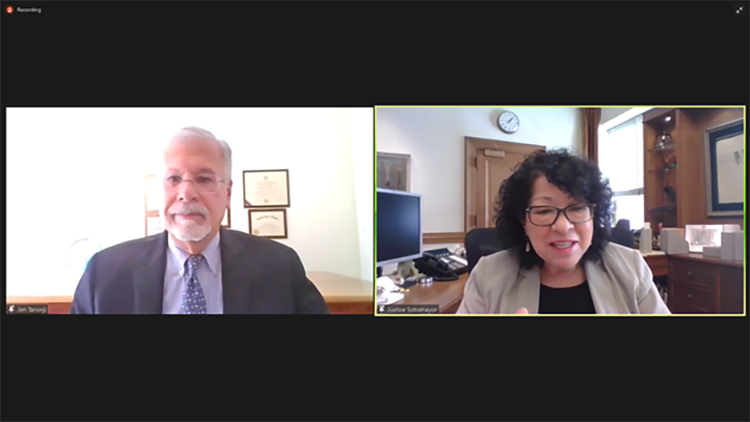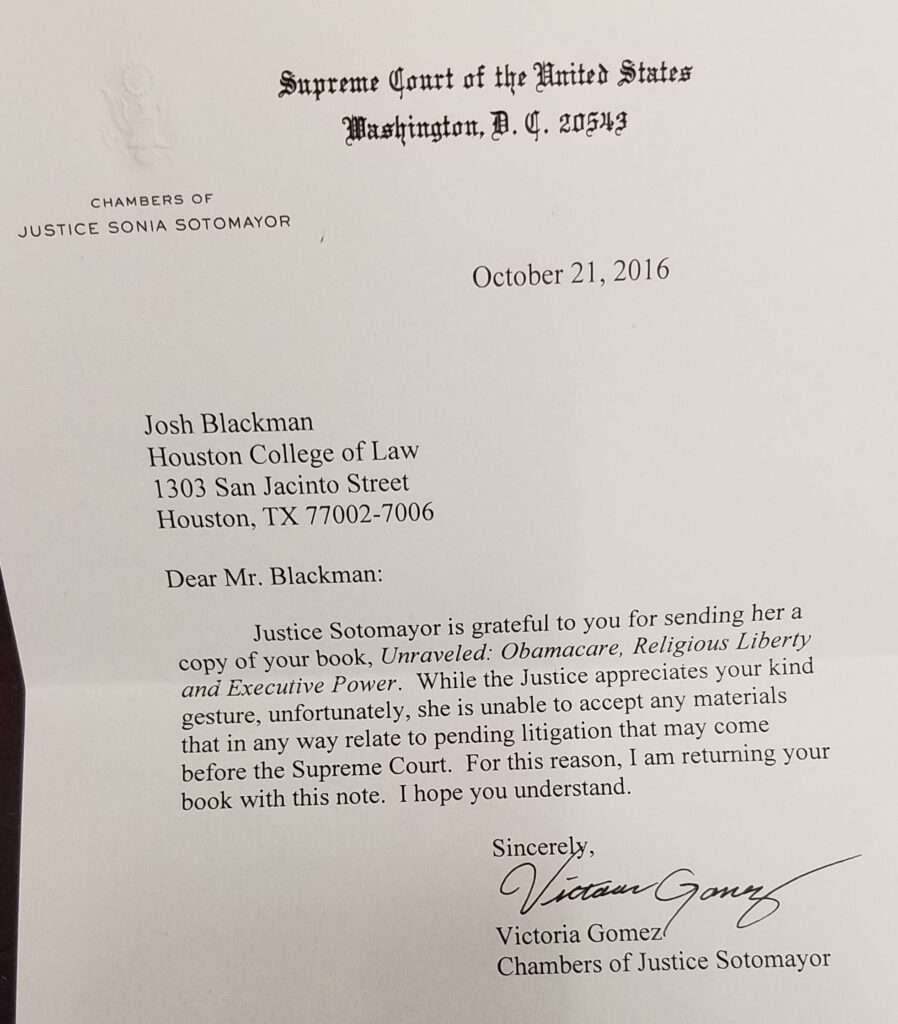The Volokh Conspiracy
Mostly law professors | Sometimes contrarian | Often libertarian | Always independent
Making Sense of Justice Sotomayor's Comments on S.B. 8
Did she cross the line?
On Wednesday, Justice Sotomayor spoke at an ABA conference about diversity. The event was livestreamed to attendees, but I could not find a video anywhere. The ABA Journal included a screenshot of the Zoom call:

During the event, Justice Sotomayor opined on S.B. 8. You know my general policy about relying on reporter paraphrases, though I am slightly more confident that SCOTUS reporters covered the event.
Here is the account from the Washington Post by Ann Marimow and Bob Barnes:
Sotomayor was among the four dissenters who would have stopped the law taking effect, and in a virtual appearance at an American Bar Association summit on diversity, she mentioned the Texas law, which she wrote in her dissent was "flagrantly unconstitutional." She told a questioner that "there's going to be a lot of disappointments in the law, a huge amount."
"As you study cases and look at outcomes you disagree with, it can get frustrating," she said. "Look at me, look at my dissents, okay?" she said, laughing. "At least I have a vehicle, I have a dissent mechanism that I can explain how I feel."
She continued: "So you know, I can't change Texas's law, but you can. You can and everyone else who may or may not like it can go out there and be lobbying forces in changing laws that you don't like."
"I'm pointing out to that when I shouldn't because they told me I shouldn't," she said, referring to the practice by which justices refrain from commenting outside the court setting on cases that are before them.
"But the point is, there are going to be a lot of things you don't like," she said.
Ariane de Vogue of CNN also reported on the event:
"There is going to be a lot of disappointment in the law, a huge amount," she said Wednesday at an event hosted by the American Bar Association. "Look at me, look at my dissents."
Earlier this month, Sotomayor penned a scathing opinion when the court's majority allowed the Texas law to go into effect, calling the action "stunning."
"You know, I can't change Texas' law," Sotomayor said Wednesday, "but you can and everyone else who may or may not like it can go out there and be lobbying forces in changing laws that you don't like."
The justice then caught herself speaking about a contentious case currently before the court.
"I am pointing out to that when I shouldn't because they tell me I shouldn't," she said. "But my point is that there are going to be a lot of things you don't like" and that the public can change.
The quotations from CNN and WaPo are nearly identical, so I have a relatively high degree of confidence that Justice Sotomayor was accurately quoted. (If anyone finds the video, please send me a link so I can transcribe it). Still, it is not entirely clear what she was saying.
As I read it, Justice Sotomayor urged the people in attendance who oppose S.B. 8 should lobby to repeal S.B. 8. But then she stopped herself, recognizing that she had gone too far. The sentence, as quoted, is hard to follow: "I am pointing out to that when I shouldn't because they tell me I shouldn't." Who is "they"? Was someone in the room waving at her, telling her to stop? Or did a flag go off in her head mid-sentence? Did she suddenly recall some ethics advice she received?
Did Justices Sotomayor cross the line? I have a few thoughts.
First, it is fairly common for Justices to write that laws should be changed in a published opinion. Perhaps the most famous example of this dynamic was Justice Ginsburg's plea to Congress in Ledbetter v. Goodyear. But these pleas generally come in the opinion itself. Sotomayor did not make such an appeal in her Jackson dissent. She made it the appeal in a public speech.
Second, it has become fairly common for Justices to talk about their opinions--especially their dissents. But Justice Sotomayor did not argue in her Jackson dissent that S.B. 8 should be repealed. She argued the law was unconstitutional. Her "lobby" argument was presented for the first time in her remarks.
Third, it is extremely rare for a Justice to talk about a case that is still pending. On September 1, the Court denied a stay in Whole Woman Health v. Jackson. But that case is now pending before the Court on plenary review. The parties filed a petition for certiorari before judgment. The case is pending. And I know from personal experience that Justice Sotomayor takes this issue seriously.
In 2016, I mailed copies of my book Unraveled to all of the Justices. Several sent me very nice notes in response. Some of the Justices may have read the book on their Kindle. Chief Justice Roberts probably used it for kindling. Alas, Justice Sotomayor's assistant mailed the book back. Her letter stated:
Justice Sotomayor is grateful to you for sending her a copy of your book, Unraveled: Obamacare, Religious Liberty and Executive Power. While the Justice appreciates your kind gesture, unfortunately, she is unable to accept any materials that in any way relate to pending litigation that may come before the Supreme Court. For this reason, I am returning your book with this note. I hope you understand.

By Justice Sotomayor's own standard, her remarks about S.B. 8 crossed the line. To avoid any appearance of impropriety, she was unwilling to even accept a book that discussed an already-decided case. She returned the book to me--with taxpayer funded postage--lest anyone think that my writings influenced her opinion! Had she thrown the book in the trash, or the fireplace, no one would have ever known. Yet, she urged a public audience of attorneys to lobby against a law, the legality of which is presently before the Court. Indeed, Justice Sotomayor's comments seemed to recognize she went too far.
Will she recuse? Probably not. And does anyone doubt how she will vote in light of her dissent? Still, Justice Sotomayor exercised poor judgment here. When asked about a pending case, she should have simply said, "I cannot comment on a pending case."


Show Comments (114)